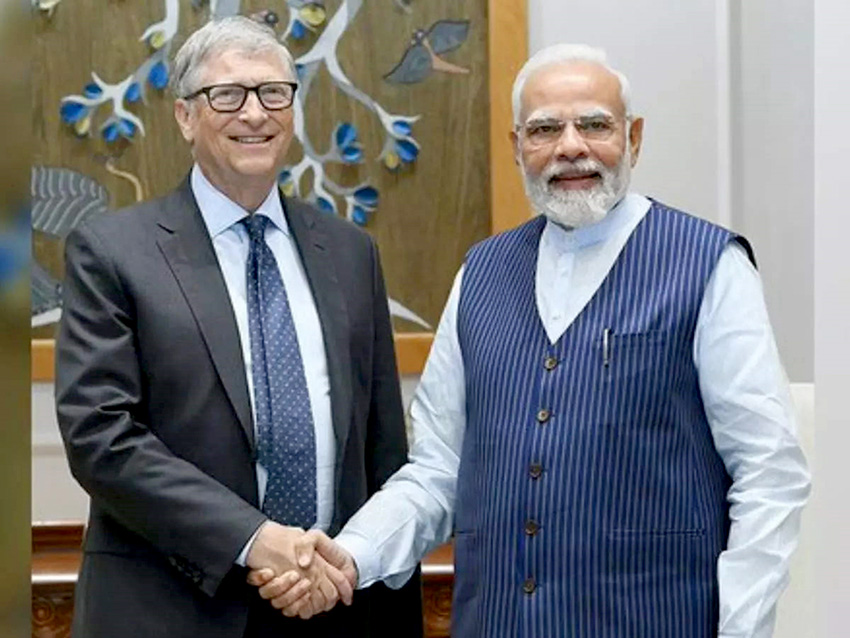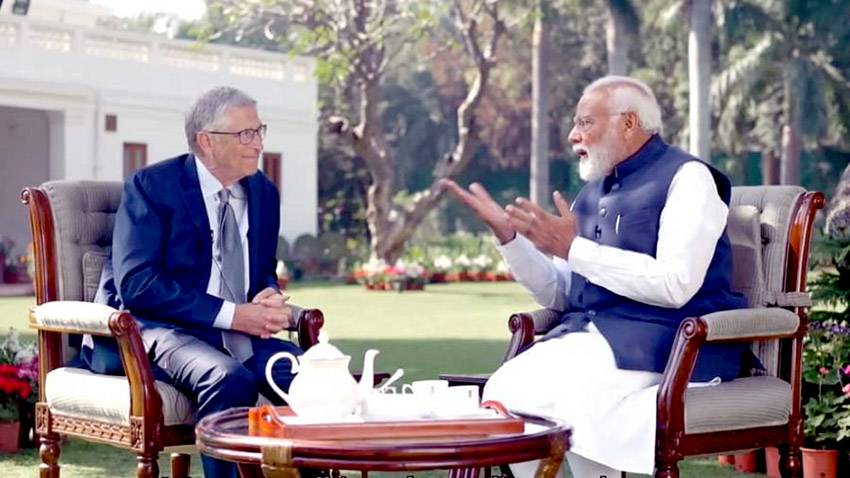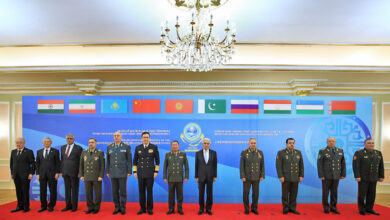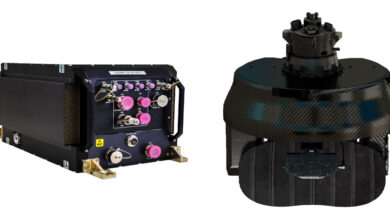Digital Facilities Reaching India’s Villages, Government Committed towards Digital Inclusivity for the Progress of the Country: PM Modi
By R. Anil Kumar
-
Prime Minister Narendra Modi engaged in a conversation with Bill Gates, covering a spectrum of critical topics ranging from Artificial Intelligence to India’s impressive advancements in digital technology.
-
We Need to Establish Some Dos And Don’ts”: PM Modi-Bill Gates Discuss Ethical AI Usage
-
Their conversation delved into the transformative role of technology in healthcare, showcasing India’s innovative use of drones to empower the ‘Nari Shakti’
-
They also explored India’s remarkable success in combating the COVID-19 pandemic with indigenously developed and produced vaccines, highlighting the nation’s self-reliance in crucial healthcare solutions
-
Moreover, they touched upon India’s proactive stance in addressing climate change, underscoring the country’s commitment to sustainable development
New Delhi. Prime Minister Narendra Modi on March 29, engaged in a candid conversation with philanthropist and Microsoft co-founder Bill Gates, discussing a wide array of topics ranging from technological advancements to the challenges and opportunities presented by Artificial Intelligence (AI).

PM Narendra Modi shed light on India’s progress in various sectors in his interaction with billionaire philanthropist Bill Gates.
Government is committed towards Digital inclusivity for the progress of the country and digital facilities are being extended to villages and the government is using technology for ease of living of people Prime Minister Modi said.
The Prime Minister also stated that Artificial Intelligence (AI) was used during the G20 Summit hosted by India last year.
AI has been one of the focus areas of the government PM Modi stated.
Prime Minister Narendra noted that he has decided not to let digital divide hamper the progress of the country and digital facilities are being extended to villages.
The Prime Minister said that he used Artificial Intelligence (AI) during the G20 Summit hosted by India last year, and also uses it for some other tasks.

During the interaction, Prime Minister Narendra Modi highlighted the role and benefits of technology and Artificial Intelligence (AI) while also emphasising the need of regulations.
He said AI was used for interpretation and translation during the G20 Summit held in New Delhi.
“We had extensive discussions before the G20 Summit, and as you might have seen, the Summit’s proceedings took a lot of turns. I believe we have now aligned with G20s core purposes and objectives, bringing them to the mainstream. I hope your first-hand experience echoes this sentiment,” he said.
PM Modi said during the first and second industrial revolutions, India lagged behind because it was a colony. “Now, in the midst of a fourth industrial revolution, the digital element is at its core. I am confident that India will gain a lot in this,” he said
The Prime Minister said that children call their mother “Aai” in some parts of the country.
“AI is very important. Sometimes, I jokingly say that in our country, we call our mother ‘Aai”. Now I say that when a child is born, he says ‘Aai’ as well as AI as children have become so advanced,” he said.
PM Modi referred to NaMO app and demonstrated how AI adds significant value.
“I am using my NaMo app, and I use AI extensively, which proves immensely beneficial across the country. Here is my photo booth, take a selfie. You can see, every photo of you and me, from the last 20 years is available here. even if you’re barely visible in a public event photo, as long as I am in it, and even if your one tenth part is visible, it recognises and retrieves it. This illustrates the day-to-day applications of technology and I believe, such innovations add significant value,” he said.
“We should embrace these technologies to enhance daily life for everyone. My aim is to ensure that users feel comfortable and recognise its utility and encouraging them to innovate and contribute new features,” he added.
PM Modi stressed the intelligent use of AI and said that using it as a magic tool would be a great injustice. He underscored that effort should be to surpass the capabilities of AI, not to rely on them because of personal laziness.
“Labeling AI merely as a magic tool, will lead to great injustice. If I am relying on AI due to laziness,. For example, I am too lazy to draft a letter, so I use ChatGPT, which is not the right approach. Instead, we should compete with AI, challenge it, and strive to surpass its capabilities. Currently, I’m pushing AI to recognise and adapt to the myriad languages and dialects we have,” he said.
“During an introduction with astronauts, I was trying to understand the work progress while I am interacting with the robot. I interacted with the robots a lot in varying tones which resulted in nuanced responses. Then I called the robot with a changed name, and it led to no response at all. This prompted a conversation with AI, where, despite speaking for several minutes it failed to recognise my voice without hearing its name. I expressed the need for it to identify my voice, without a direct prompt. I consistently present new challenges to AI, fostering its growth and adaptability,” PM Modi said, referring to his interaction with the AI-powered robot.
He said government is using technology for ease of living of people.
“I had decided that I would not let digital divide hamper the progress of my country. Digital public infrastructure is a big requirement in itself. Today, I am extending digital facilities to all our villages,” he said.
AI has been one of the focus areas of the government. The Cabinet had recently approved the comprehensive national-level IndiaAI mission with a budget outlay of Rs. 10,371.92 crore. The IndiaAI mission will establish a comprehensive ecosystem catalysing AI innovation through strategic programs and partnerships across the public and private sectors.





